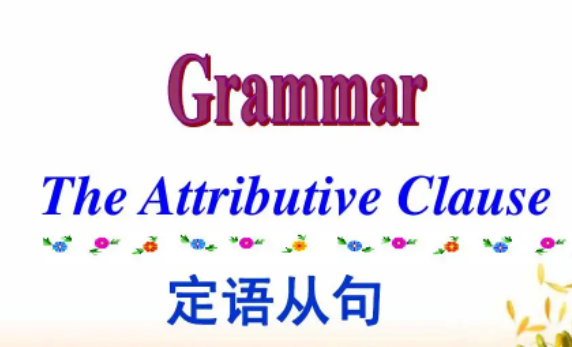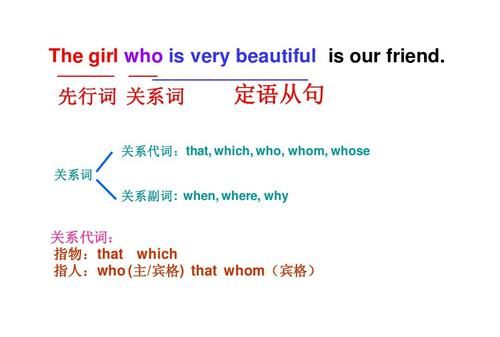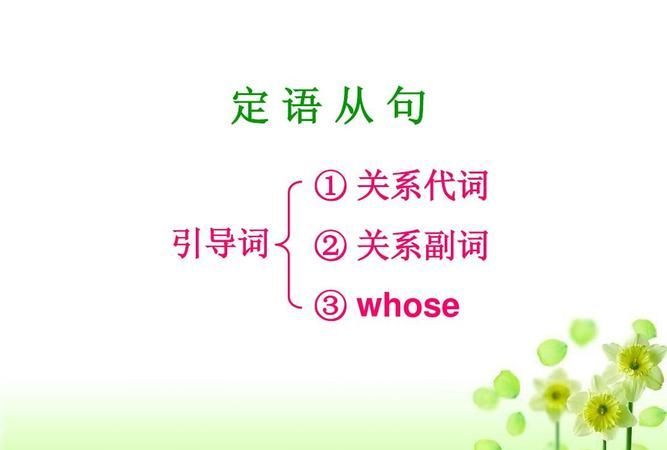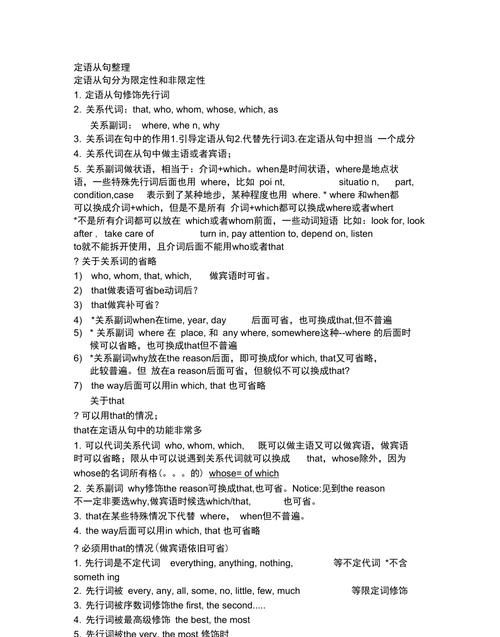本文目录
定语从句例句
定语从句例句如下:
1、Have you got the postcard(which) I sent you?
你收到我寄给你的明信片了吗?
语法分析:在限制性定语从句中,当关系代词在从句中作宾语时,在绝大多数情况下可以省略,尤其在口语中。
2、Come any time you like.
你随便什么时候来都行。
语法分析:有些表示时间的定语从句并不由when引导,特别是在某些句型中。
3、That's the way I look at it.
这就是我对这事情的看法。
语法分析:在way后也可以跟一个定语从句,不需要关系代词或副词。

4、Anything I can do for you?
我能为你做点什么?
语法分析:在被修饰的词为all或everything时,作宾语的关系代词可以省略。
5、That's the place we met last year.
这是我们去年见面的地方。
语法分析:关系副词where有时也可以省略。
定语从句的用法归纳
定语从句归纳及用法 1
I 关系代词引导的定语从句
关系代词所代替的先行词是人或物的名词或代词,并在句中充当主语、宾语、定语等成分,英语定语从句知识和用法概述。关系代词在定语从句中作主语时,从句谓语动词的人称和数要和先行词保持一致。
1)who, whom, that
这些词代替的先行词是人的名词或代词,在从句中作主语和宾语。例如:
Is he the man who/that wants to see you? 他就是你想见的人吗?(who/that在从句中作主语)
He is the man whom/ that I saw yesterday. 他就是我昨天见的那个人。(whom/that在从句中作宾语)
2) whose 用来指人或物,(只用作定语, 若指物,它还可以同of which互换)。例如:
They rushed over to help the man whose car had broken down. 那人车坏了,大家都跑过去帮忙。
Please pass me the book whose (of which) cover is green. 请递给我那本绿皮的书。
3)which, that所代替的先行词是事物的名词或代词,在从句中可作主语、宾语等。例如:
A prosperity which / that had never been seen before appears in the countryside.
农村出现了前所未有的繁荣。(which / that在句中作宾语)
The package (which / that)you are carrying is about to come unwrapped. 你拿的包快散了。(which / that在句中作宾语)
II. 关系副词引导的定语从句
关系副词可代替的先行词是时间、地点或理由的名词,在从句中作状语。
1)关系副词when, where, why的含义相当于"介词+ which"结构,因此常常和"介词+ which"结构交替使用。例如:
There are occasions when (on which) one must yield. 任何人都有不得不屈服的时候。
Beijing is the place where(in which) I was born. 北京是我的出生地。
Is this the reason why (for which) he refused our offer? 这就是他拒绝我们帮助他的理由吗?
2)that代替关系副词,可以用于表示时间、地点、方式、理由的名词后取代when, where, why和"介词+ which"引导的定语从句,在口语中that常被省略。例如:
His father died the year (that / when / in which) he was born. 他父亲在他出生那年逝世了。
He is unlikely to find the place (that / where / in which) he lived forty years ago. 他不大可能找到他四十年前居住过的地方。
III.判断关系代词与关系副词
方法一: 用关系代词,还是关系副词完全取决于从句中的谓语动词。及物动词后面无宾语,就必须要求用关系代词;而不及物动词则要求用关系副词。例如:
This is the mountain village where I stayed last year. 这是我去年呆过的山村。
I'll never forget the days when I worked together with you.我永远不会忘记与你共事的日子。
判断改错:
(错) This is the mountain village where I visited last year.
(错) I will never forget the days when I spent in the countryside.
(对) This is the mountain village (which) I visited last year.
(对) I'll never forget the days (which) I spent in the countryside.
习惯上总把表地点或时间的名词与关系副词 where, when联系在一起。此两题错在关系词的误用上。
方法二: 准确判断先行词在定语从句中的成分(主、谓、宾、定、状),也能正确选择出关系代词/关系副词。
例1. Is this museum ___ you visited a few days age?
A. where B. that C. on which D. the one
例2. Is this the museum ____ the exhibition was held.
A. where B. that C. on which D. the one
答案:例1 D,例2 A
例1变为肯定句: This museum is ___ you visited a few days ago.
例2变为肯定句: This is the museum ___ the exhibition was held.
在句1中,所缺部分为宾语,而where, that, on which都不能起到宾语的作用,只有the one既做了主句的表语,又可做从句的宾语,可以省略关系代词,所以应选D,英语语法《英语定语从句知识和用法概述》。
而句2中, 主、谓、宾俱全,从句部分为句子的状语表地点,既可用副词where,又因 in the museum词组,可用介词in + which 引导地点状语。而此题中,介词on 用的不对,所以选A。
关系词的选择依据在从句中所做的成分,先行词在从句中做主、定、宾语时,选择关系代词(who, whom, that, which, whose); 先行词在从句中做状语时,应选择关系副词 ( where 地点状语,when 时间状语,why 原因状语) 。
IV. 限制性和非限制性定语从句
1) 定语从句有限制性和非限制性两种。限制性定语从句是先行词不可缺少的部分,去掉它主句意思往往不明确;非限制性定语从句是先行词的附加说明,去掉了也不会影响主句的意思,它与主句之间通常用逗号分开。例如:
This is the house which we bought last month. 这是我们上个月买的那幢房子。(限制性)
The house, which we bought last month, is very nice.这幢房子很漂亮,是我们上个月买的。(非限制性)
2) 当先行词是专有名词或物主代词和指示代词所修饰时,其后的定语从句通常是非限制性的。例如:
Charles Smith, who was my former teacher, retired last year. 查理?史密斯去年退休了,他曾经是我的老师。
My house, which I bought last year, has got a lovely garden. 我去年买的的那幢房子带着个漂亮的花园。
This novel, which I have read three times, is very touching. 这本小说很动人,我已经读了三遍。
3) 非限制性定语从句还能将整个主句作为先行词, 对其进行修饰, 这时从句谓语动词要用第三人称单数。例如:
He seems not to have grasped what I meant, which greatly upsets me. 他似乎没抓住我的意思,这使我心烦。
Liquid water changes to vapor, which is called evaporation. 液态水变为蒸汽,这就叫做蒸发。
说明:关系代词that和关系副词why不能引导非限制性定语从句。
V. 介词+关系词
1)介词后面的关系词不能省略。
2)that前不能有介词。
3)某些在从句中充当时间,地点或原因状语的'"介词+关系词"结构可以同关系副词when 和where 互换。例如:
This is the house in which I lived two years ago. 这是我两年前住过的房子。
This is the house where I lived two years ago.
Do you remember the day on which you joined our club? 还记得你加入我们俱乐部的那一天吗?
Do you remember the day when you joined our club?
VI. as, which 非限定性定语从句
由as, which 引导的非限定性定语从句,as和which可代整个主句,相当于and this或and that。As一般放在句首,which在句中。例如:
As we know, smoking is harmful to one's health. 如我们所知,吸烟有害健康。
The sun heats the earth, which is very important to us. 太阳使地球暖起来,这对我们人类很重要。
典型例题
1)Alice received an invitation from her boss, ___came as a surprise.
A. it B. that C. which D. he
答案C. 此为非限定性从句,不能用 that修饰,而用which.,it 和he 都使后
句成为句子,两个独立的句子不能单以逗号连接。况且选he句意不通。
2)The weather turned out to be very good, ___ was more than we could expect.
A. what B. which C. that D. it
答案B。which可代替句子,用于非限定性定语从句,而what不可。That 不能用于非限定性定语从句,it不为连词,使由逗号连接的两个句子并在一起在英语语法上行不通。
3)It rained hard yesterday, ____ prevented me from going to the park..
A. that B. which C. as D. it
答案B. as 和which在引导非限制性定语从句时,这两个关系代词都指主句所表达的整个意思,且在定语从句中都可以作主语和宾语。但不同之处主要有两点:
(1)as 引导的定语从句可置于句首,而which不可。
(2) as 代表前面的整个主句并在从句中作主语时,从句中的谓语必须是系动词;若为行为动词,则从句中的关系代词只能用which.。在本题中,prevent由于是行为动词,所以正确选项应为B。
as 的用法
例1. the same…as;such…as 中的as 是一种固定结构, 和……一样……。例如:
I have got into the same trouble as he (has). 我碰到了跟他一样的麻烦。
例2. as可引导非限制性从句,常带有'正如'。例如:
As we know, smoking is harmful to one's health. 如我们所知,吸烟有害健康。
As is known, smoking is harmful to one's health.
As是关系代词。例1中的as作know的宾语;例2中,它充当从句的主语,谓语动词know要用被动式。
VII. 先行词和关系词二合一
1) Whoever spits in public will be punished here. (Whoever 可以用 anyone who 代替)
定语从句归纳及用法 2
一、定语从句的识别
1、结构识别:名词+连接词+句子
【例句】Kevin gave us a wonderful training course, which left us a deep impression.
【解析】这个句子的前身应该是这样的:Kevin gave us a wonderful training course. It left us a deep impression. it就是指代前面这个句子,这样两个句子就有了共有的名词,连接两个具有共同名词的句子是定语从句的作用,就可以用which代替it,这样就有了示例中的非限定性定语从句。
2、常用连接词:
关系代词:who, whom, which, that, as, whose
关系连词:when, where, why, how
介词+关系代词:as和that以及who一般不能接到介词后引导句子
二、定语从句的处理方法
1、按照定语的处理方法将定语从句前置,这种处理方式适用于比较短的和起修饰限定作用的定语从句。
2、在考研中大多数的定语从句起的作用是连接句子,因此我们通常把定语从句从整个句子中独立拆分出来单独成为一个句子,这种处理方法的关键是找到连接词,拆分点就是连接词。
对于“介词+连接词”引导的定语从句,拆分点就在介词处。
【例句】There is something by virtue of which man is man.
【译文】存在一种特性,人之所以为人就是由于这种特性。
【解析】这句话其实是由以下两句话变来的:
1)There is something.
2)Man is man by virtue of this thing.这两句话中有共有的名词something和this thing,用which替换掉this thing再把of which提前,得到:There is something of which man is man by virtue
三、例句分析
【例句】Such large, impersonal manipulation of capital and industry greatly increased the numbers and importance of shareholders as a class, an element in national life representing irresponsible wealth detached from the land and the duties of the landowners; and almost equally detached from the responsible management of business.
【译文】对资本和企业的这种大规模的非个人操纵大大增加了股东作为一个阶级的数量和重要性。这个阶层作为国计民生的一部分,代表了非个人责任的财富与土地及土地所有者应尽义务的分离,而且也几乎与责任管理相分离。
【解析】句子的主干为:Such large, impersonal manipulation of capital and industry greatly increased…shareholders as a class, (which was) an element…这句话的难点还在于其主语和宾语都有较长的短语和of结构限定,并且分句是由两个and相连的3个部分组成的。
分句an element…landowners又带有两个定语从句,一个是(which was)representing…,另一个是(which was)detached…。可见,定语从句的难点在于经常省略“引导词+be”的结构,从而在理解上容易和分词结构相混淆。实际上定语从句并不符合汉语的使用习惯。所以翻译时遇上定语从句,一定不要机械地按照原来的顺序生搬硬套。像这样分句较长的情况,把主句和分句拆为两句是比较好的方法。所以这里从“这个阶层”开始另起一句。
定语从句归纳及用法 3
定语从句在初中英语中的重要性主要体现在完形、阅读和写作中,因此,能否较好的掌握定语从句直接关系到你英语成绩的拔高。其实,定语从句并不难.
一. 定语从句的概念
在复合句中,修饰某一名词或代词的从句叫定语从句。被修饰的名词或代词叫先行词,引导定语从句的词叫关系词,定语从句一般放在先行词的后面。
二. 引导定语从句的关系词
引导定语从句的关系词有关系代词和关系副词,常见的关系代词包括that, which, who(宾格whom,所有格whose)等,关系副词包括where, when, why等。关系代词和关系副词放在先行词及定语从句之间起连接作用,同时又作定语从句的重要成分。
三. 定语从句的分类
根据定语从句与先行词的关系,定语从句可分为限制性定语从句及非限制性定语从句。限制性定语从句紧跟先行词,主句与从句不用逗号分开,从句不可省去。非限制性定语从句与主句之间有逗号分开,起补充说明作用,如省去,意思仍完整。
四. 关系代词的用法
1. that 既可以用于指人,也可以用于指物。在从句中作主语、宾语或表语。作主语时不可省略,作宾语可省略。例如:
Mary likes music that is quiet and gentle.
玛丽喜欢轻柔的音乐。(that作主语)
The coat (that) I put on the desk is blue.
我放在桌子上的那件外套是蓝色的。(that作宾语)
2.which用于指物,在句中作主语、宾语或表语。作主语不可省略,作宾语可省略。例如:
The building which stands near the train station is a supermarket.
位于火车站附近的那座大楼是一家超市。(作主语)
The film (which) we saw last night was wonderful.
我们昨天晚上看的那部电影很好看。(作宾语)
3.who, whom用于指人,who 用作主语,whom用作宾语。在口语中,有时可用who代替whom。who和whom作宾语时也可省略。例如:
The girl who often helps me with my English is from England.
经常在英语方面帮助我的那个女孩是英国人。(作主语)
Who is the teacher (whom) Li Ming is talking to?
正在与李明谈话的老师是谁?(作宾语)
注意:
(1)当定语从句中含有介词,介词放在句末时,who,whom,that, which可省略,但介词在关系代词前时,只能用介词+which/whom结构。例如:
This is the house in which we lived last year.
这是我们去年居住的房子。
Please tell me from whom you borrowed the English novel.请告诉我你从谁那借的这本英文小说。
(2)含有介词的固定动词词组中,介词不可前置,只能放在原来的位置上。例如:
This is the person whom you are looking for.
这就是你要找的那个人。
(3)that 作介词的宾语时,介词不能放它的前面,只能放在从句中动词的后面。例如:
The city that she lives in is very far away.
她居住的城市非常远。
(4)关系词只能用that的情况:
a. 先行词被序数词或形容词最高级所修饰,或本身是序数词、基数词、形容词最高级时,只能用that,而不用which.例如:
He was the first person that passed the exam.
他是第一个通过考试的人。
b. 被修饰的先行词为all, any, much, many, everything, anything, none, the one等不定代词指物时,只能用that,而不用which.例如:
Is there anything that you want to buy in the shop?
你在商店里有什么东西要买吗?
c. 先行词被the only, the very, the same, the last, little, few 等词修饰时,只能用that,而不用which.例如:
This is the same bike that I lost.
这就是我丢的那辆自行车。
d. 先行词里同时含有人或物时,只能用that, 而不用which.例如:
I can remember well the persons and some pictures that I saw in the room.
我能清楚记得我在那个房间所见到的人和一些照片。
e. 以who或which引导的特殊疑问句,为避免重复,只能用that.例如:
Who is the girl that is crying?
正在哭泣的那个女孩是谁?
f. 主句是there be 结构,修饰主语的定语从句用that,而不用which,例如:
There is a book on the desk that belongs to Tom.
桌子上那本书是汤姆的。
(5)关系词只能用which,而不用that 的情况:
a. 先行词为that, those时,用which, 而不用that.例如:
Whats that which is under the desk?
在桌子底下的那些东西是什么?
b. 关系代词前有介词时,which,而不用that.例如:
This is the room in which he lives.
这是他居住的房间。
c. 引导非限制性定语从句,先行词指事物时,用which, 而不用that,例如:
Tom came back, which made us happy.
汤姆回来了,这使我们很高兴。
五. 关系副词的用法
1. when指时间,其先行词表示时间,when在定语从句中作时间状语。例如:
This was the time when he arrived.
这是他到达的时间。
2. where指地点,其先行词表示地点,where在定语从句中作地点状语。例如:
This is place where he works.
这是他工作的地点。
3. why 指原因,其先行词是原因,why在定语从句中做原因状语。例如:
Nobody knows the reason why he is often late for school.
没人知道他为什么上学总迟到。

定语从句20例句带翻译简单
(1) who引导的非限制性定语从句
Our guide,who was a French Canadian,was an excellent cook.我们的向导,一个法裔加拿大人,擅长于烹调。
My gardener,who is very pessimistic,says that there will be no apples this year.我家的园丁非常悲观,他说今年将不结苹果。
(2) whom引导的非限制性定语从句
关系代词whom用于指人,在句中作动词宾语和介词宾语,作介词宾语时,介词可位于句末。如:
Peter, whom you met in London, is now back in Paris.彼得现在回巴黎了,你在伦敦见过他。
Mr Smith,from whom I have learned a lot,is a famous scientist.史密斯先生是一位著名的科学家,我从他那儿学了许多东西。
(3) whose引导的非限制性定语从句
whose是关系代词who的所有格形式,在从句中作定语。whose通常指人,也可指动物或无生命的事物。如:
The boy, whose father is an engineer, studies very hard.那位小男孩学习很努力,他的.父亲是位工程师。
Above the trees are the mountains whose magnificence the river faithfully reflects on the surface. 在树林的高处是山,其壮丽的景色完全映照在河面上。The play,whose style is rigidly formal,is typical of the period.这剧本是那个时期的典型作品,风格拘谨刻板。
(4) which引导的非限制性定语从句
关系代词which在非限制性定语从句中所指代和修饰的可以是主句中的名词、形容词、短语、其他从句或整个主句,在从句中作主语、动词宾语、介词宾语或表语。
① which指代主句中的名词,被指代的名词包括表示物、婴儿或动物的名词、表示单数意义的集体名词以及表示职业、品格等的名词。如:
These apple trees,which I planted three years ago,have not borne any fruit.这些苹果树是我三年前栽的,还没有结过果实。
She is an artist,which I am not.她是一位艺术家,而我不是。
Water,which is a clear liquid,has many uses.水是一种清澈的液体,有许多用途。
The two policemen were completely trusted,which in fact they were.那两个警察完全受到信任,事实上,也真是如此。
② which指代主句中的形容词。如:
She was very patient towards the children,which her husband seldom was.她对孩子们很耐心,她丈夫却很少这样。
She is always careless,which we should not be. 她总是马虎大意,我们可不应该这样。
③ which指代主句中的某个从句。如:
He said that he had never seen her before,which was not true.他说以前从没见过她,这不是真的。
④ which指代整个主句。如:
In the presence of so many people he was little tense, which was understandable.在那么多人面前他有点紧张,这是可以理解的。
He may have acute appendicitis,in which case he will have to be operated on.他可能得了急性盲肠炎,如果是这样,他就得动手术。
When deeply absorbed in work,which he often was,he would forget all about eating and sleeping. 他经常聚精会神地工作,这时他会废寝忘食。
(5) when引导的非限制性定语从句
关系副词when在非限制性定语从句中作时间状语,指代主句中表示时间的词语。如:
He will put off the picnic until May 1st, when he will be free.他将把郊游推迟到5月1号,那时他将有空。
(6) where引导的非限制性定语从句
关系副词where在非限制性定语从句中作地点状语,指代主句中表示地点的词语。如:
They went to London,where they lived for six months.他们去了伦敦,在那儿呆了六个月的时间。
They reached there yesterday, where a negotiation of sale will be held.他们昨天抵达那里, 有一个关于销售的谈判在那儿举行。
(7) as引导的非限制性定语从句
as引出非限定性定语从句时,代替整个主句,对其进行说明但通常用于像as we allaknow, as it is know, as is know to all, as it is, as is said above, as always mentioned above, as is usual, as is often the case, as is reported in the newspaper等句式中。as在非限定性定语从句中作主语、表语或宾语,且引出的从句位置比较灵活,可位于句首或句末,也可置于主句中间。通常均由逗号将其与主句隔开。as有“正如……, 就像……”之意。 如:
As it known to the United States, Mark Twain is a great American writer.美国人都知道,马克?吐温是一位伟大的美国作家。(as在从句中作主语)
He forgot to bring his pen with him, as was often the case. 他忘了带笔,这是常事。(as在从句中作主语)
He is absorbed in work, as he often was. 他正在全神贯注地工作,他过去经常这样。(as在从句中作表语)
Boy as he was, he was chosen king. 他虽是孩子,却被选为国王。(as在从句中作表语)
as we all know, the earth is round.众所周知,地球是圆的。 (as在从句中作宾语)
The two brothers were satisfied with this decision,as was agreed beforehand.两兄弟对此决定都满意,这项决定在事前都已得到他们的同意。(as在从句中作主语)
Taiwan is,as you know,an inseparable part of China.你知道,台湾是中国不可分割的一部分。(as在从句中作宾语)
(8)“介词+关系代词”引导的非限制性定语从句 在介词后引导非限制性定语从句。
关系代词which有时并不代表主句中某一确定的词,而是概括整个主句的意思。介词的选择取决于它与先行词的搭配或与从句中谓语动词的搭配。
They were short of sticks to make frames for the climbing vines,without which the yield would be halved. 他们缺搭葡萄架的杆儿,没有它们产量会减少一半。
They thanked Tom,without whose support they would not have succeeded.这些邻居是北京来的,昨天我被介绍同他们认识了。
(9)“名词/代词+of+which / whom”引导的非限制性定语从句
It now has 20,000 hectares of land,more than two-thirds of which are under cultivation. 现在它拥有两万公顷土地,其中三分之二之多已经耕种。
Light is the fast thing in the world, the speed of which is 300.000 kilometeThere are 30 chairs in the small hall, most of which are new.大厅里有三十把椅子,绝大部分是新的。
he textile mill has over 8,000 workers and staff,eighty per cent of whom are women. 这家纺织厂有8千多职工,女职工占百分之八十。

定语从句例句及分析
定语从句
定语从句(Attributive Clauses)在句中做定语,修饰一个名词或代词,有时也可以修饰部分或整个句子.
被修饰的名词,词组或代词即先行词.定语从句通常出现在先行词之后,由关系词(关系代词或关系副词)引出.
关系代词有:who, whom, whose, that, which,as .
关系副词有:when, where, why ,how .
关系代词和关系副词放在先行词和定语从句之间,起连接作用,同时又可做定语从句的一个成分.当关系代词做宾语时可以省略.
定语从句中的谓语动词必须在人称上和数量上和先行词保持一致.
定语从句分为限制性定语从句和非限制性定语从句.
1 、关系代词引导的定语从句
1)who, whom, that
这些词代替的先行词是人的名词或代词,在从句中所起作用如下:
Is he the man who/that wants to see you?(who/that在从句中作主语)
He is the man whom/ that I saw yesterday.(whom/that在从句中作宾语)
2) Whose 用来指人或物,(只用作定语, 若指物,它还可以同of which互换),
例如:
They rushed over to help the man whose car had broken down. Please pass me the book whose (of which) cover is green.
3)which, that
它们所代替的先行词是事物的名词或代词,在从句中可作主语、宾语等,例如:
A prosperity which / that had never been seen before appears in the countryside.(which / that在句中作宾语)
The package (which / that) you are carrying is about to come unwrapped. (which / that在句中作宾语)
关系代词that和which 都可以指物,that 和Who 都可以指人,其用法区别:
1)不用that的情况
a) 在引导非限定性定语从句时
(错) The tree, that is four hundred years old, is very famous here.
b) 介词后不能用
We depend on the land from which we get our food.
c)多用who 的情况
①关系代词在从句中做主语
A friend who helps you in time of need is a real friend .
②先行词为those , people 时
Those who were either fools or unfit for their offices could not see the cloth .
③先行词为all, anyone , ones , one 指人时
One who doesn’t work hard will never succeed in his work .
④在There be句型中
There is a stranger who wants to see you .
⑤在被分隔的定语从句中
A new teacher will come tomorrow who will teach you German .
⑥在有两个定语从句的句子中,其一用who,其二用that,但若先行词后接两个以上的并列定语从句时,后一个必须重复前一个关系代词.
The student who was praised at the meeting is the monitor that is very modest and studies very hard .
There is a teacher who is always ready to help others and who enjoys what he does .
2) 只能用that作为定语从句的关系代词的情况
a) 在不定代词,如:anything, nothing, everything, all, much, few, any, little等作先行词时,只用that,不用which.
All that is needed is a supply of oil.
Finally, the thief handed everything that he had stolen to the police.
b) 先行词有the only, the very, the just修饰时,只用that.
He is the very man that helped the girl out of the water .
c) 先行词为序数词(the last)、数词、形容词最高级时,只用that..
The first English book that I read was “The Prince and the Pauper” by Mark Twin .
d) 先行词既有人,又有物时.
He talked about the teachers and schools that he visited .
e)当主句是以who 或which 开始的特殊疑问句时,用that 以避免重复.
Who is the person that is standing at the gate .
f)关系代词在从句中做表语
He is not the man that he used to be .
2 、关系副词引导的定语从句
关系副词可代替的先行词是时间、地点、方式或理由的名词,在从句中作状语.
1)when, where, why,how
关系副词when, where, why,how的含义相当于"介词+ which"结构,因此常常和"介词+ which"结构交替使用,例如:
There are occasions when (on which) one must yield.
Beijing is the place where (in which) I was born.
Is this the reason why (for which) he refused our offer?
I’m surprised the way how (by which) he works out the problem .
注意:
①在非限制性定语从句中,"介词+ which"结构不能代替关系副词.
如:They set up a state for their own , where they would be free to keep Negroes as slaves .
②含有介词短语的动词一般不能拆开,介词仍放在动词后面.
Is this the book which (that) she was looking for ?
3、名词/数词/代词 /形容词最高级 + 介词 + 关系代词引导定语从句
She has written a book , the name of which I have forgotten .
There are fifty-five students in our class , all of whom are working hard .
There are five continents in the world , the largest of which is Asia .
4、 as, which 引导非限定性定语从句的差别:
由as, which 引导的非限定性定语从句,as和which可代整个主句,相当于and this或and that.As一般放在句首,which在句中.
As we know, smoking is harmful to one's health.
The sun heats the earth, which is very important to us.
as可引导非限制性从句,常带有'正如'的意思.
As is know, smoking is harmful to one's health.
用法区别:
(1) as 引导的定语从句可置于句首,而which不可.
As we all know , he never smokes .
(2) as 代表前面的整个主句并在从句中作主语时,从句中的谓语必须是系动词;若为行为动词,则从句中的关系代词只能用which..
(3)非限定性定语从句中出现expect , think , suppose 等表示猜测、想象、预料等时.
She succeeded in her doing the research work , as we expected .
(4)As 的用法 the same… as;such…as 中的as 是一种固定结构, 和……一样…….
I should like to use the same tool as is used here .
We should have such a dictionary as he is using .

以上就是关于定语从句例句分析 ,定语从句例句的全部内容,以及定语从句例句分析 的相关内容,希望能够帮到您。

